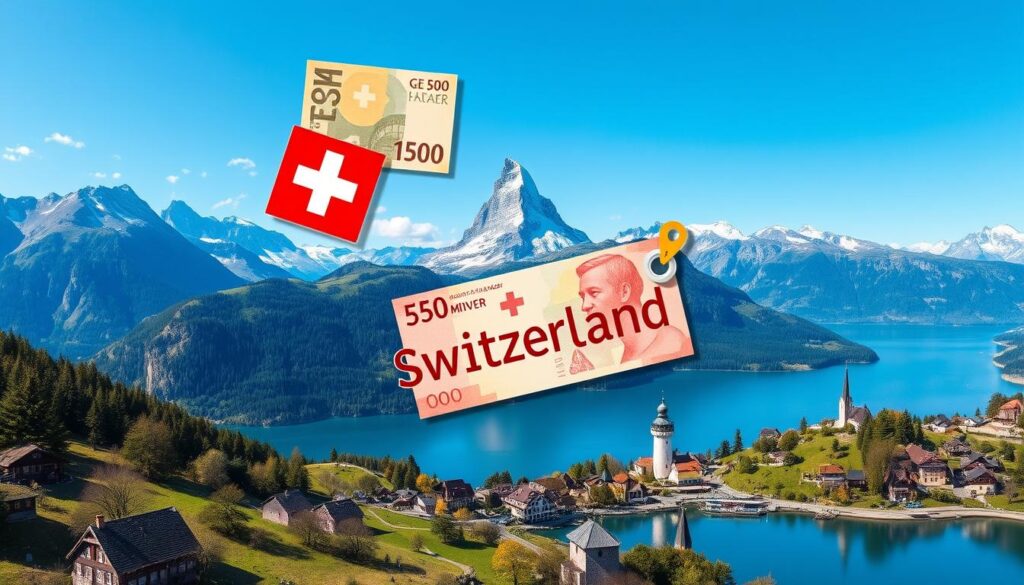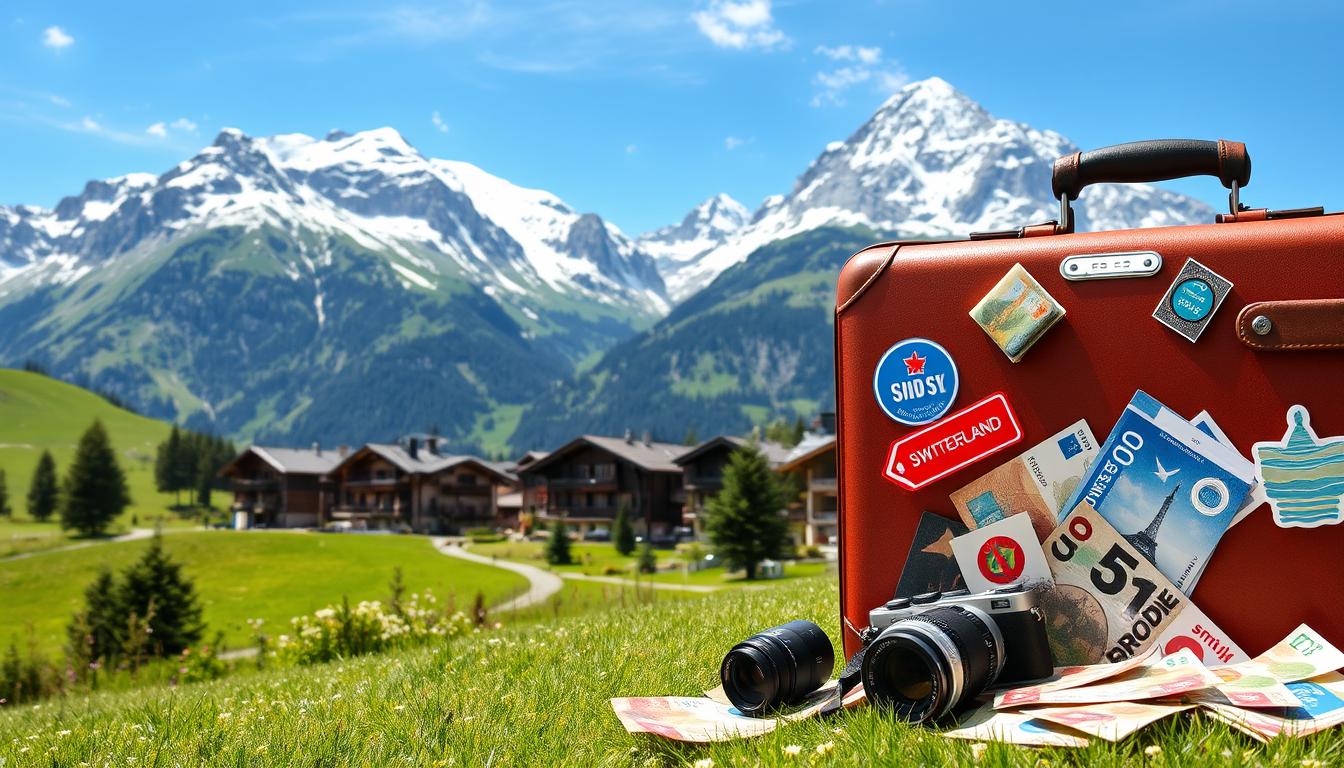Is It Cheaper to Visit Switzerland or Italy | Cost overview
Planning your European trip? You might wonder if it’s cheaper to go to Switzerland or Italy. Both places are full of culture, beautiful views, and amazing experiences. But, the cost of traveling is a big part of choosing where to go. Let’s look at the expenses in these two beautiful countries.
Table of Contents
Overview of Travel Costs Between Switzerland and Italy
When looking at affordable European spots, Switzerland and Italy are key contenders. Both offer beautiful views and rich culture. Yet, travel costs differ significantly.
General Cost Differences
Switzerland is pricier than Italy, especially for places to stay, food, and getting around. This is due to Switzerland’s high living standards and strong economy. It makes traveling there more expensive.
Understanding Price Variations by Season
Prices in Switzerland and Italy change a lot with the seasons. Summer is the busiest and most expensive time. But, visiting in the shoulder or off-season can lead to cheaper rates and fewer people.
Key Factors Affecting Travel Expenses
- Accommodation choices (e.g., hostels, mid-range hotels, luxury resorts)
- Dining options (from budget-friendly cafes to high-end restaurants)
- Transportation methods (e.g., public transit, taxis, rental cars)
- Planned activities and sightseeing (including entrance fees)
Knowing these factors helps plan a budget-friendly trip. Whether you’re heading to Switzerland or Italy, you can save money.
| Cost Category | Switzerland | Italy |
|---|---|---|
| Average Daily Food Cost | $109 (Sfr94) | $40-$60 |
| Accommodation (Budget) | $50+ per night | $30-$60 per night |
| Accommodation (Mid-range) | $150-$250 per night | $80-$150 per night |
| Transportation (Public) | $2-$10 per one-way ticket | $1-$3 per one-way ticket |
These examples show the cost differences between Switzerland and Italy. They help you plan your trip more wisely.

Switzerland’s Reputation as an Expensive Destination
Switzerland is known as one of the priciest countries globally. Travelers often find the cost of living in Switzerland and switzerland travel costs to be high. This is especially true when compared to other expensive places.
But, there are ways to save money and enjoy Switzerland on a budget. You can use discount passes, eat street food instead of fancy meals, and stay in guesthouses instead of luxury hotels. The country has many options, from CHF 23 (€24) per night for hostel dorms to CHF 900 (€950) for fancy hotel suites.
| Expense Category | Cost Range |
|---|---|
| Average Airfare | $70 – $1,200 |
| Accommodation | $80 – $200 |
| Transportation | $3 – $10 |
| Food | $30 – $60 |
| Drinks | $6 – $40 |
| Attractions | $15 – $100 |
| Total (excluding airfare) | $134 – $410 |
Switzerland’s high prices are true, but with smart planning, you can still enjoy its beauty, culture, and amenities. You don’t have to spend a lot to have a great time here.

“Switzerland offers a range of budgets, from CHF 23 (€24) per night for hostel dorms to CHF 900 (€950) for luxury hotels.”
Accommodation Costs in Switzerland
Accommodation in Switzerland varies a lot. You can find cozy hostels or fancy hotels. There’s something for everyone, no matter your budget.
Budget Options: Hostels and Guesthouses
Travelers on a tight budget can choose hostels and guesthouses. Dorms cost between CHF 40 to CHF 60 (€42 to €63) per night. Top picks include Zurich Youth Hostel, Bern Backpackers, and Young Backpackers Homestay in Lucerne.
Mid-range Hotels and Their Prices
Mid-range hotels offer a comfy stay. Prices are between CHF 170 (€180) and CHF 211 (€233) for a double room. You get private bathrooms, dining, and are close to sights.
Luxury Accommodations and Alternatives
Luxury hotels in Switzerland can cost over CHF 900 (€950) per night. But, there are cheaper options like Floatinn Boat-BnB in Geneva. It’s a boat cabin near the Jet d’Eau fountain for CHF 206 (€218) per night.
Switzerland’s accommodation costs fit any budget. Whether you want a hostel, a mid-range hotel, or luxury, you can find it. Planning ahead helps you save on switzerland travel costs and budget travel europe.
Italian Accommodation Options and Pricing
Italy offers more affordable places to stay compared to Switzerland. You can find everything from cheap hostels to fancy resorts. Prices change based on where you are, with big cities like Rome and Florence costing more.
In Rome, a four-star hotel costs about $650 per night. Five-star hotels can go over $1,500. But, Italy has many affordable options too.
In Tuscany, you can stay in agriturismos or villas for $1,500 to $3,500 a week. These places are cheap and let you experience the real Italian countryside.
| Accommodation Type | Average Nightly Rate |
|---|---|
| Four-Star Hotel in Rome | $650 |
| Five-Star Hotel in Rome | $1,500+ |
| Agriturismo or Villa Rental in Tuscany | $1,500 – $3,500 per week |
Italy has something for everyone, whether you want luxury or a budget-friendly trip. With some planning, you can find great deals and enjoy Italy’s beauty and culture.
Is It Cheaper to Visit Switzerland or Italy: A Direct Comparison
Travel costs in Switzerland and Italy differ, offering unique experiences. Let’s explore the main areas where your budget might vary.
Transportation Costs
Traveling in Switzerland can be pricier than in Italy. Its public transport is efficient but expensive. Train and metro fares can quickly increase your expenses. Yet, Switzerland’s transit is top-notch, making it easy to get around.
Food and Dining Expenses
Eating out in Switzerland is costly, with a daily food budget of about $109 (Sfr94) per person. Breakfast costs $20-$33, lunch $16-$54, and dinner $38-$87. Italy, however, offers more budget-friendly dining, letting you enjoy local dishes without overspending.
Entertainment and Activities
Switzerland’s ski resorts and mountain activities are pricey, affecting your budget. Italy, though, has a variety of historical sites, cultural events, and natural wonders at different prices. This gives you more options for planning your trip.
Choosing between Switzerland and Italy depends on your preferences and budget. Knowing the cost differences helps you plan a trip that fits your budget and maximizes your experience.
Food Costs and Culinary Experiences in Switzerland
Exploring switzerland travel costs and cost of living in switzerland reveals a lot about food. Swiss dishes are famous worldwide. You’ll find everything from Zurcher Geschnetzeltes to Cervelat sausage and fondue.
Cities like Zermatt, Interlaken, and Zurich have lively food scenes. Geneva and Lausanne are also known for their food. Prices for meals vary, with breakfast costing $20-$33, lunch $16-$54, and dinner $38-$87.
Coffee is a big part of Swiss culture, costing about $10 per cup. Fast food or street food is around $17. For a deeper experience, food tours and cooking classes are available for $138 to $203 per person.
| Meal | Average Cost Range |
|---|---|
| Breakfast | $20 – $33 |
| Lunch | $16 – $54 |
| Dinner | $38 – $87 |
| Coffee | $10 |
| Fast Food / Street Food | $17 |
| Food Tours and Cooking Classes | $138 – $203 |
Switzerland has something for every food lover, no matter your budget. Knowing the switzerland travel costs and cost of living in switzerland for food helps plan your trip. You can enjoy the country’s famous dishes without breaking the bank.
Budget-Friendly Travel Tips for Switzerland
Switzerland is known for being pricey, but you can still explore it on a budget. Look for affordable places to stay, cheap ways to get around, and smart ways to eat out. These tips will help you enjoy Switzerland without spending too much.
Money-Saving Strategies
- Stay in hostels or guesthouses to save on lodging.
- Use discount passes like the Swiss Travel Pass for unlimited travel.
- Choose street food or grocery shopping to eat cheaply, not at restaurants.
- Find free or low-cost activities like hiking and visiting museums on free days.
- Buy discounted bakery goods at Äss Bar stores across Switzerland.
- Use the Too Good to Go app for cheap surplus restaurant food.
Best Time to Visit for Better Rates
Visiting during the shoulder seasons of spring and fall can save you money. These times have lower airfares and hotel rates than summer. Also, some cities offer free public transport for tourists. Check for any special deals during your visit.
With these budget tips, you can enjoy Switzerland without overspending. A bit of creativity and flexibility will help you see the country’s beauty and culture while keeping costs low.
Making the Most of Your Swiss Travel Budget
Traveling to Switzerland doesn’t have to be expensive. With smart planning and budgeting, you can enjoy a great trip without spending too much. Here are some tips to help you save money:
- Purchase a Swiss Travel Pass: This pass gives you unlimited access to buses, trains, and some mountain railways. It starts at 244 CHF for a 3-day pass in second class. It’s a great deal for those who travel a lot.
- Take advantage of free activities: Switzerland has lots of natural beauty and free experiences. Explore towns, hike in the Alps, and visit free museums to save money.
- Embrace the great outdoors: Instead of eating out, pack a picnic. Enjoy the lakes and parks in Switzerland. This can save a lot on food.
- Look for budget accommodation: Stay in hostels, guesthouses, or budget hotels to save on lodging. You can also try Couchsurfing or Agrotourismus for even more savings.
By planning smart and choosing experiences over luxury, you can manage your switzerland travel costs better. You’ll have a great time exploring affordable european destinations in Switzerland.
“Traveling to Switzerland doesn’t have to be a financial burden. With a little creativity and flexibility, you can explore this stunning country on a budget.”
Comparing Popular Tourist Destinations: Swiss vs Italian Cities
Choosing between Switzerland and Italy for your European trip is a big decision. Both countries have amazing places to visit, each with its own special charm. It’s key to look at the costs and compare the popular spots to find the best fit for your budget and tastes.
Switzerland’s cities, like Zurich, Geneva, and Lucerne, are famous for their stunning mountains and top-notch public transport. But, they come with a higher price tag. In contrast, Italian cities like Rome, Florence, and Venice offer rich history, amazing art, and a lively culture at lower costs.
Think about what you’ll spend on places to stay, food, and activities. Switzerland might offer a luxury experience, but Italy can give you unforgettable moments without breaking the bank. Your choice will depend on what you love, how you like to travel, and what you’re looking for in a trip.







